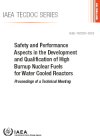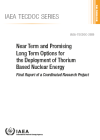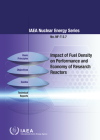Performance and reliability of nuclear fuel are important factors for the safe and efficient operation of nuclear power plants (NPPs). Nuclear fuel needs to be robust and be operated effectively for optimum length without fuel related adverse impacts on power generation, such as plant down times or increased levels of occupational exposure.
Nuclear fuel utilization
Whether already operating NPPs or embarking on a nuclear power programme, Member States place great importance on the harmonization and transfer of essential techniques for the economic and safe operation of nuclear fuel. Quality control procedures and safety standards must be applied to the design, fabrication, operation and management of this fuel, as well as the verification and certification of its associated technologies and tools.
In accordance with applicable regulations, the IAEA assists Member States in implementing appropriate strategies for the operational part of the life-cycle of fuel (procurement, quality control, core design, and activities during NPP outages). To support effective fuel utilization, the IAEA gathers and analyses data obtained from about 95% of all operating units on fuel rod failures, including statistics, root causes and mechanisms. These studies also include analyses of fuel structural damage and other fuel assembly issues potentially affecting core performance – synthesized together, they provide guidance on preventing fuel failure and ensuring its proper management in NPPs.
The IAEA Safety Standards and related IAEA Nuclear Energy and Safety Series publications establish a consistent safety framework for design, fabrication and quality of nuclear fuel and core components for its safe operation in NPPs.








